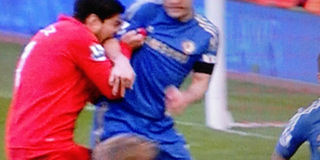Deal with ‘Suarez’ traits in children

Suarez bites Ivanovic on the arm in a Premier League match. Such habits are dangerous
What you need to know:
When a child bites others to defend him or herself, what do you do? Joseph Kato spoke to experts on how to handle the habit before it turns into a vice.
Toddlers do the most adorable things; give unexpected hugs, squeal with laughter, and cuddle up to you when they are tired. But as any parent of a toddler will tell you, they also do some not-so-adorable things like kick, scream and bite.
Experts in child behaviour say when children are not discouraged from using teeth as a weapon when young, the habit is likely to advance in adulthood.
Recently, Uruguay striker Luis Suarez, 27, appeared to bite Italian defender Giorgio Chiellini in his country’s final group game at the ongoing 2014 World Cup in Brazil. The Liverpool frontman had previously bitten Chelsea defender Branislav Ivanovic on the arm in a Premier League match at Anfield in April last year, in another incident not seen by the referee. Suarez later issued an apology and he was fined by the club, donating the money to the Hillsborough Family Support Group.
How it comes about
Maxe Nalugoti, a trauma counsellor at Uganda Counselling Association, says behaviour like biting can be caused by tough childhood situations which include growing up on streets, violent parents, separated parents, loneliness, severe illnesses and injuries.
“Though not socially acceptable, biting is normal behaviour among children under three years. They bite to express their excitement, anger and frustration. Therefore, they need parental guidance to ensure that the habit does not go on until their adulthood,” says Nalugoti, adding: “Some adults bite for pleasure while others do it to vent their anger.” George Kiwanuka, a banker, says his three-year-old son bites to defend himself.
“The other day, my son’s friend
grabbed his toy and snack from him. What my son did was sink his little teeth in his friend’s arm until I rushed to rescue the victim. I pray he does not become little Suarez,” jokes Kiwanuka.
Latif Saima, a psychologist and lecturer at Salford University, says biting is an act borne of frustration, mental problems, emotional stress and lack of self-control. “People who bite others have psychological issues and deep-seated problems,” Saima says.
Tips and advice
Nalugoti advises parents to strive beyond reaction mode when they want to stop children from biting before it becomes a dilemma. “Some children need
time before they can stop biting. Parents should emphasise teaching toddlers good behaviour as early as possible.” She also encourages parents to pay close attention to circumstances that cause the child to bite because it helps to pinpoint what seems to trigger bites.
“Once the parent knows what prompts the biting, she can step in to ease the tension before it occurs,” she adds. “Giving simple punishments can also help children to stop biting. However, parents should also know that behavioural change needs patience and they should not overreact when the child takes long to change,” she says. Nalugoti further stresses parents
should use interventions targeted at the toddler like reacting swiftly and educating children on other techniques such as reporting to teachers or parents in case they are assaulted. “It is also good to talk about feelings and reactions with the victim and a frank discussion of what can be done instead of biting. This helps to cut the probability that the victim will retaliate by biting,” she says.
Nalugoti advises mothers to seek help from specialists in children behaviour if a child doesn’t respond to adults’ efforts and continues biting others after three years of age. Don’t rush to a therapist; seek help or advice first from friends and other parents, or teachers who can also point you in the right direction.
If signs of biting show...
• Distract your child with a toy or book.
Suggest looking out the window or take a walk to another room or outside. The goal is to reduce the tension and shift your child’s attention.
• Suggest how your child might handle the situation that is triggering the need to bite.
For example: Marianne, you can tell Tiara: “You are a little too close to me. I don’t like it when you touch my hair.” If you think your child might be biting due to a need for oral stimulation, offer your child something he can safely bite and chew—a cracker, some carrot sticks, or a teether.
• Suggest ways to share.
Take out a timer to give children a visual reminder of how long they can each play with a particular toy. In a group caregiving setting, you will want to make sure that the classroom has more than one of the most popular toys. Sharing is one of the most common triggers for biting.
• Reading books about biting can also help. As you read, ask your child how the different characters might be feeling. If you have an older toddler, you can ask him to “read” the book to you, by telling you what is happening based on the pictures. Some titles to recommend include: Teeth Are Not for Biting by Elizabeth Verdick,
What WILL NOT stop biting
Shaming or harsh punishment do not reduce biting, but they increase your child’s fear and worry thus increase biting incidents. Such aggressive responses do not teach your child social skills.
Biting your child back. This teaches your child that it is okay to bite people when you are upset! Human bites are dangerous.




